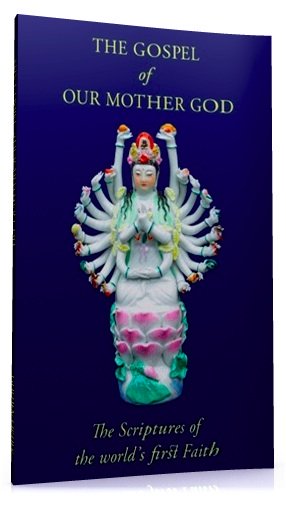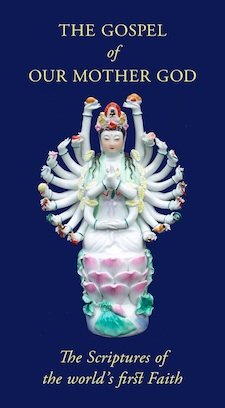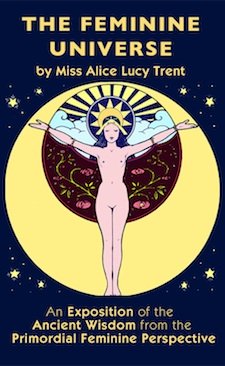Lux Madriana and the Filianic Scriptures
Lux Madriana was a religious movement active in Britain in the 1970s. Relatively little is known about it despite plentiful speculation.
Its main claim to being remembered is that it was the first organization to publish the Filianic Scriptures – or at least a version of them.
Because Lux Madriana was the first organization to publish (a version of) the Scriptures it is often taken as the originator of them, and they are sometimes attributed to "a member of Lux Madriana" and even referred to as "the Madrian Scriptures".
It is important to understand that even Lux Madriana itself never claimed to have originated the Scriptures. What it did claim was that it was heir to a "secret hereditary tradition" still extant in the British Isles.
That claim was incorrect and we do not believe anyone today upholds that there is a secret hereditary tradition. It may have been a "poetic" way of expressing the spiritual heritage of the Scriptures, but as a literal, physical statement it is not factual.
They were in use by several, sometimes overlapping, groups of which the Madrians were one and the very early Aristasians another. The writer or writers did not associate their names with the work because they did not see it as an individual production (this is a very normal traditional attitude) but a "revelation", supported by Divine Signs, and did not wish any personal element whatsoever to enter into it. The Scriptures, it was felt, should be judged on what they are, not on where they came from.
The term "Madrian Scriptures" is appropriate only in describing the particular version used and published by Lux Madriana, a version which many hold to be far from the best or purest.
Some early Aristasians in Telluria believed the Filianic Scriptures to be equivalent (not identical) to those used in the Motherland and adopted them and the Filianic faith. Others felt doubtful because of their recent Tellurian origins and lack of tradition.
The debate continued for years in Aristasia, but even while the theory was debated, in practice the Filianic Scriptures became the basis of Aristasian devotional practice in Telluria. They won the hearts of Aristasians because of their purity and truth.
This was partly aided by the fact that Aristasians had always sought the purest texts – those untouched by the New-Age accretions that gathered around other versions.
Examples of this are found more recently in the so-called "Amazon Method" invented by a gentleman claiming to represent Lux Madriana (the organization, while at times mixed, did not ever allow males into positions of authority or teaching) and in some highly unsound pseudo-metaphysical commentaries. Worse still, the Scriptures have been adopted (predictably in the Madrian versions) by "female domination" cults that mix religiosity with soft pornography.
Probably such corruptions were inevitable and this was possibly one reason why the Aristasian overlapping group was so cautious for so long about making the Scriptures public.
The Aristasian approach has been cautious in the extreme – some might even say too austere – in accepting only those Scriptures that are absolutely free of any doubtful material.
In terms of religious practice, the Aristasian approach was to leave the question open as to whether the Filianic Scriptures were regarded as Revealed Scripture or poetic expressions of faith; and also to examine the parallels between Filianic religion and the Sanskrit tradition, the worship of Kwan Yin and other traditional Déanic expressions, making it clear that each of them is essentially a different way of understanding the same Truth. Western ideas of religious exclusivism and literalism were deconstructed and the idea that one could take Filianism as an enhancement to a Déanic faith without having to over-literalize it became the key to much modern Filianic worship.
Out of this has come The Gospel of Our Mother God, a text which is accepted by Aristasians and non-Aristasians alike, which adopts a rigorously cautious approach to the Scriptures, accepting as canonical only those without a trace of adulteration, and places them side by side with Sanskrit and other Déanic texts to make clear the unbroken heritage that comes not from a "secret tradition" but from the simple and eternal unity of the Truth of Our Mother God.
After publication of this article we received the following note from a correspondent familiar with the Lux Madriana movement:
When it is said that Lux Madriana was the first organization to publish the Filianic Scriptures, this is correct but a little more detail could be added here. We need to remember that we are talking about the 1970s before the internet and before desktop publishing. Publishing anything was a complex and expensive process.
Only a minority of the Scriptures were actually issued in booklet form: the rest were simply circulated as hand-typed papers that were photocopied or retyped. This made them very vulnerable to alterations and redactions. We continue to see these to this day. The addition of elements, for example, and of "clearer" wording that implies New-Age ideas.
Lux Madriana actually tried to regulate this process by stamping copies circulated within its sphere of influence with the "Madrian Literature Circle" imprint; however, there were several "Madrian" versions in many cases, and many others outside the Madrian ambit.
Lux Madriana's published version of a part of the Scriptural body had already been circulated in this form for some time beforehand and was subject to this process.
The nearest thing to a definitive version is that found in The Gospel of Our Mother God which is the product of careful research and metaphysical understanding of the texts (sadly lacking elsewhere), together with a very cautious approach that puts the emphasis on creating a spiritual resource that can be trusted.
Now see:
Please support the Chapel of Our Mother God
Send Questions or Comments on Lux Madriana and the Filianic Scriptures
Chapel of Our Mother God Homepage
All written material at the Chapel of Our Mother God is copyright. Should you wish to reproduce any portion please contact us for permission.
YouTube or Facebook
This section:
Fundamental Beliefs
A complete guide to the faith of God the Mother
FILIANIC SCRIPTURES
Gospel of Our Mother God
The Gospel of Our Mother God is a collection of inspirational texts, prayers and daily inspiration for the Mother-Faith devotee or household.
The Feminine Universe
The Other Philosophy
Everything you have ever heard comes out of the patriarchal world-view. Its materialism, its religion, even its feminism. Here is the other way of seeing the world; the natural way: the way that everyone saw things before patriarchy and will again when patriarchy is long forgotten.


